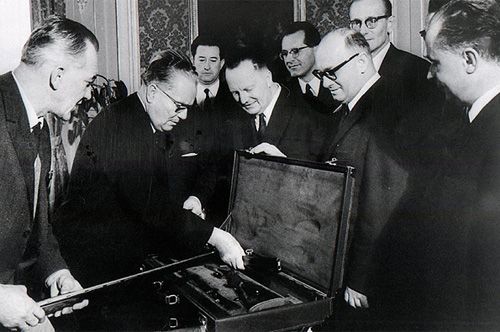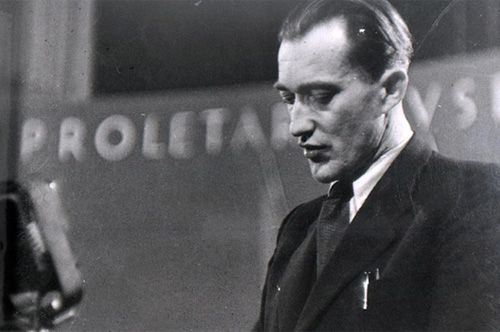The ZKP emerged in the turbulent years after the Second World War and emerged from the Liberation Front (OF), which contributed to the final collapse of the Nazi regime with many sacrifices during the war and as part of the Allied forces, Its contribution to the liberation of the Slovenian nation was considerable, but it should be emphasized that it also contributed significantly to the liberation of Austria from National Socialism, among other things by fighting three Austrian battalions for a free and democratic Austria within its framework.
After May 1945, the Provincial Committee of the Liberation Front for Slovenian Carinthia also addressed the specific needs of former partisans, their descendants and supporters, but it soon became clear that a separate organization was needed for this area of work, which also took care of the social needs of these people (e.g. orphans who had lost their parents, etc.). To this end, it was important to keep a register of former fighters and their supporters, who were often held in prisons and barracks under the Nazi regime and suffered not only in terms of their health, but also due to the destruction of their homes, the loss of their loved ones, and so on. The former partisans could rely neither on the British and Austrian nor on the Carinthian authorities, which is also reflected in the founding of the ZKP itself.
In spring 1946, the former partisans initially attempted to found the Association of Carinthian Partisans, but on April 4, the proponent of the foundation, Dr. Luka Sienčnik, received the news that the British military government had forbidden the foundation on the grounds that the British could not tolerate an armed formation in their zone of occupation. This was of course only a pretext, as it was clear from the submitted statutes that it was by no means an armed formation, but an association that wanted to promote comradeship among former fighters, stand up for the just punishment of war criminals, support the widows and descendants of the fallen partisans, search for the graves of the fallen, collect material about the resistance movement and establish cooperation between Austrian and Slovenian anti-fascists. The next impetus to found such an organization came in the summer of 1947, when Lipej Kolenik, Andrej Haderlap, Janko Male, Marko Wieser and Janko Gröblacher announced the founding of the “Association of Former Partisans of Slovenian Carinthia” to the Carinthian provincial government. After six weeks, during which the provincial government could have raised objections, Andrej Haderlap announced the founding general assembly on September 23, 1947 in Klagenfurt on August 30, 1947. After discussions between the authorities in Klagenfurt and Vienna, the Federal Police Directorate in Klagenfurt issued an official permit for the general assembly on September 15, 1947, which was held and at which Andrej Haderlap, Dr. Franc Petek, Dr. Joško Tischler and Karel Prušnik-Gašper, among others, spoke.

Karl Prušnik-Gašper, Tito, Mirt Zwitter, Franci Zwitter, Reginald Vospernik, Hanzi Ogris, Vienna, 16.2.1967 - foto:Family arhive Prušnik
Karel Prušnik-Gašper was elected president, Dr. Luka Sienčnik and Janez Galob were elected vice-presidents, Andrej Haderlap became secretary and Janko Gröblacher was appointed organizational secretary. The results of the General Assembly were reported late to the Security Directorate on November 3, 1948, and the society was officially entered into the register of associations on December 3. So this year marks the 70th anniversary of the founding of the ZKP.
The specific documents that would reveal the reasons for this delay are not yet known, but it can be assumed that the conviction of President Karel Prušnik before a British military court for insulting the British military government in the fall of 1947 and his imprisonment in the Karlau penitentiary until mid-June 1948, among other unfriendly coincidences between the British authorities and the Slovenian activists, had an influence on this. The British military authorities often reacted disproportionately to Slovenian demonstrations for the annexation of part of Carinthia to Yugoslavia, which gave Slovenian activists the impression that even ex-Nazis were closer to the British than to the former Allies. On the other hand, there were also things that showed the sympathy of at least parts of the British authorities for the Slovenes' aspirations for equality, such as the speech by the British representative on November 17, 1946, on the occasion of the ceremonial transfer of the fallen partisans from Svinska planina mountain to the Šentrupert cemetery near Velikovec. The “Album of Carinthia. Slovene Carinthia in Pictures”, which was produced at the end of December 1947 for the ‘Psychological Warfare Branch’, i.e. the propaganda department of the military government, by Officer Gerald Sharp, who wrote a dedication in memory of the victims among the Carinthian Slovenes during the war, also shows a certain sympathy for the Slovenian side. However, only a few copies were sold at the time and a new edition was immediately printed with the amputated title “Album of Carinthia” and without the dedication.
With the decision of the peace conference on the Austrian-Yugoslav border in 1949, the conditions for the Slovenian organizations changed, two new political representative organizations were founded, but the tasks of the partisans and their supporters remained essentially the same, only under different conditions. One of the tasks was to collect material on the course of persecution and resistance. One of the first results was the collection “Koroška v borbi” (Koroška in Combat), which was published in 1951. The Regional Committee of the OF, or a special committee for this purpose, began laying out graves and erecting memorials as early as 1946. Sometimes conflicts arose with the church authorities, who, for example in Šentrupert near Velikovac, refused to allow the term “in the fight against fascism” on the memorial and pressured the clergy not to participate in the excavation and uncovering of the memorials. However, there were priests who did take part.

Speech from Karl Prušnik-Gašper , 1954 - foto:Family arhive Prušnik
Other organizations also took care of the commemoration and social welfare of former partisans and other resisters and persecutees, e.g. initially the Association of Political Internees and Convicts (known by the short name “KZ-Verband”), which was common to all Austrian parties and also had a Slovenian section for a time. In the course of the Cold War, this originally unified association split, the People's Party founded its own organization, the Socialists did likewise, so that the Communists and some others remained in the “KZ-Verband”. In any case, these three organizations were united with the ZKP at least in the joint commemoration of the victims of National Socialism at the cemetery of Trnja vas (Annabichl) in Klagenfurt, which took place every year around 26 October on the occasion of the Austrian National Day. On the Slovenian side, the “Association of Slovenian Resettled Persons” and today the “Association of Forcibly Resettled Slovenes” have also participated in the commemorations for several years.
The ZKP's main task is to look after partisan graves and memorials throughout Carinthia, local and central commemorative events and, since 1982, the museum in Peršman, which was founded at that time. The ZKP shares this care with the “Peršman Association”, where a commemoration ceremony is held every year at the end of June. Until recently, the ZKP also took care of the social needs of those who suffered physical and psychological damage as a result of National Socialism, with very intensive support from the ZSO office. In this context, the ZKP has also worked together with the ASPIS association, which deals with the processing of war trauma, etc. The ZKP receives support for its activities from the Slovenian and Austrian state and, of course, from people who pay membership fees or support the activities of the ZKP in some way, either financially or through voluntary work.